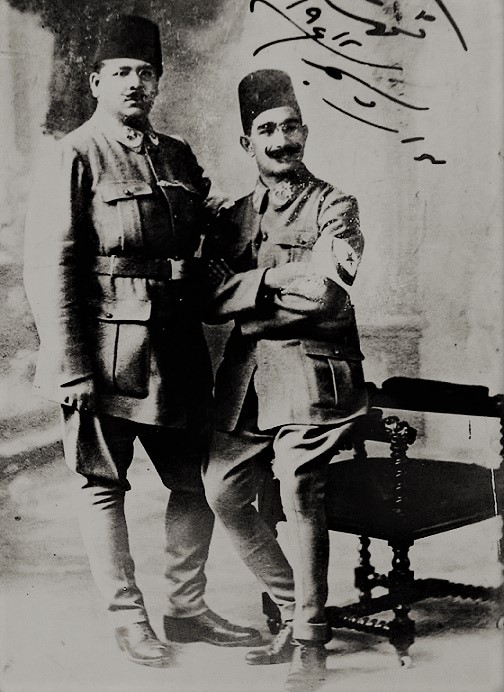
Maulana Muhammad Ali Jauhar, left, standing beside Dr Mukhtar Ahmed Ansari.
Welcoming Dr. Ansari
By Shibli Nomani
Translated from the Urdu by Noor Mohammed Khalid
This poem was recited by Allama Shibli himself, in a gathering in Mumbai, convened in honour of the returning Indian medical mission led by Dr. Mukhtar Ahmad Ansari. In mid-December 1912, the Indian Medical Mission, led by Mukhtar Ahmad Ansari, left for Turkey to treat the wounded Ottoman soldiers of the Balkan wars of 1912-13. The 25-member medical mission was fully funded by Indian Muslims. A detailed account of the medical mission is immortalized in a book titled “People’s Mission to the Ottoman Empire: MA Ansari and the Indian Medical Mission, 1912-13”, by Burak Akçapar former ambassador of Turkey to India. A link to an audio podcast detailing the seminal journey can be found here
We offer our thanks to Allah, the Singular: Al-Bari;
On the safe return of the delegation of Ansari.
You travelled several thousand miles to serve our brethren;
This, indeed, is true Islamic spirit; this is manifest compassion.
Forsaking your country, parting from family, crossing a vast distance courageously,
By God’s Grace, you did endure these travails admirably.
To thwart your mission, there was great furore,
Could be heard voices of anguish and pain of hearts sore.
The grieving eyes of relatives; their piercing, longing gaze;
The outpourings of anguished hearts, and soaring flames of filial love, to put you in a daze.
But that one passion for Islam, overcame all debility;
You forsook loved ones, to reach there to bear hefty responsibility.
In truth, you’re both an Ansari (helper) and a Muhajir (migrant);
In that you emigrated from your country, to help honour fraternal bonds.
None can obtain, even in their dreams, such good-fortune, dear;
Your night-vigils for the sick and injured which you did endure.
In truth, is befitting for you claim of being leader;
Because of the Turkish mujahideen you nursed with care tender.
No amount of accolades the community may indulge you in, can give due recognition,
To pains you shouldered in providing succour to soldiers of the religion.
To you, are as if glass pebble, a string of pearl;
For, you have witnessed, in the eyes of the orphan, gems real.
Appreciate you will why cherishes Islam life for certain;
Having now witnessed wanton blood-letting of the Christian.
Despite the virtual effacement of the Islamic consideration,
One can discern, within your throbbing heart, flickers of compassion.
————————-
Seen you have the Muslims rise and fall;
Seen you have, the turning of tides tall.
How can the dwellers of Hindustan fathom your heart’s agony,
Seen you have since increasing tyranny.
You have heard the heart-wrenching lament of the orphans;
Seen you have the unhappy faces of destitute widows.
The burning alive of the dwellers, after plundering their shelters;
Seen you have, the new norms of the Western powers.
The massacre of the Musalmans, and the Turks’ destruction;
Seen you have, the falsity of Gladstone’s[i] contention .
It’s you who have sutured the wounds of the warriors;
Seen you have, the blood-stains on the garments of the martyrs.
Your eyes that observed sights full of admonition, thus to us address:
“Seen we have, various kinds of distress.
“Seen we have eyes embellished like scattered pearls;
“Seen we have, the rose-red cheeks of the martyrs.”
——————-
In you we sense some hints of the die-hard lovers of the community;
Seen you have since those enamoured of Islam.
Obsession and fervour of Islam, if any has understood it’s you;
Seen you have since the Majnu of Islam’s Leyla.
In you there is still some hope to depend in,
Seen you have also, the secrets of the power hidden.
It would be no astonishment, should bounce back the gauntlet after sinking,
Seen we have, after all, fortune’s churning.
If acceptable to Providence is the supplication of a person elderly,
These, then, are hands raised in prayer, and this, then, is Shibli Nomani.
___________________________________________________________________________
[i] William Gladstone was Britain’s prime minister for 4 terms (1868–74, 1880–85, 1886, 1892–94). In 1876, William Gladstone wrote a pamphlet called “The Bulgarian Horrors and the Question of the East” condemning the so-called massacres that the Turks carried out while suppressing the latest Balkan revolt.

Wonderful . I appreciate